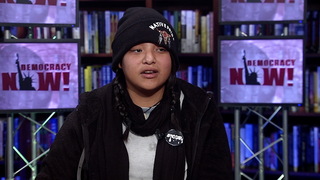
Guests
- Kevin Hartregional chief of the Assembly of First Nations, Manitoba.
We discuss the negative impact oil pipelines have on water and the climate with Regional Chief Kevin Hart of the Assembly of First Nations, Manitoba, who is attending the United Nations climate summit in Marrakech. “You can see that north of the border, in Canada, that First Nations people, indigenous people, as well as peoples from all walks of life, color and creed, are having great concerns when it comes to the future of pipeline development, not only in Canada, but the United States.”
Transcript
AMY GOODMAN: Kevin Hart is with us here in Marrakech, Morocco. He is with the Assembly of First Nations in Manitoba, Canada. I last saw him on Labor Day weekend in North Dakota at the resistance camp. This is an astonishing gathering of members of over 200 First Nations and tribes from across the Americas. Why do you think, Kevin Hart, this is so important, this gathering that you came to, as well?
KEVIN HART: Well, we know all too well that Canada is the biggest exporter of oil per—exports to the United States, and that, for myself, as a leader from Canada, that it’s very concerning that I had the portfolio of water and alternative energy, and when I was sent down to the Standing Rock Sioux Nation as an international observer for the Assembly of First Nations, you and I, of course, were on the ground and witnessed firsthand the violence that occurred to the women and the protectors on the ground. And then, leading up to that, we see that escalation of violence that’s occurring on the ground in—at the Standing Rock Sioux Nation, at the camp there.
AMY GOODMAN: How historic is this?
KEVIN HART: Pardon me?
AMY GOODMAN: How historic is this gathering in Native American history? How—
KEVIN HART: Well, the historic part of it is we knew that the—where the camp is situated, Standing Rock, that the last time a large gathering and camp occurred at that spot was just before the Little Bighorn battle.
AMY GOODMAN: So, you have gone from Canada to Standing Rock to here in Morocco. What are you demanding here? Why are you in Marrakech?
KEVIN HART: Obviously, you know that climate change and the environment affect us all. Indigenous peoples across the world, we can say that we contribute the least effects to the environment and climate change, and yet you could see that we feel the full effects when it comes to climate change and the environment across here on Mother Earth.
AMY GOODMAN: Donald Trump has said he wants to restore the permit for the Keystone XL pipeline, from Alberta tar sands, bringing that dirty oil through the United States down to the Gulf of Mexico. What would this mean? And what are you going to do about this?
KEVIN HART: Well, obviously, this is going to have a devastating effect on Mother Earth and especially the sacred source of water that we all talk about. It’s one of our most sacred sources of life for our people, according to the teachings that have been passed down since time immemorial. And for us on the Canadian side, what we call the medicine line, because for us, as Native American people on both sides of the border, there has never been a border there, including with our brothers and sisters in Mexico—so, for us, we know that it’s a very contentious issue when it comes to pipeline development across Canada. You can see that north of the border, in Canada, that First Nations people, indigenous people, as well as peoples from all walks of life, color and creed, are having great concerns when it comes to the future of pipeline development, not only in Canada, but the United States.
It’s concerning that we see President-elect Trump indicating that he would take the Keystone XL project, that was, you know, struck down by the Obama administration, and pledge to build that pipeline going down. And I just have to say that, for myself as the Manitoba regional chief, that pipeline shouldn’t be coming through my region, and he’s going to have a hard battle with our First Nations people on that side of the border.
AMY GOODMAN: Well, Regional Chief Kevin Hart, I want to thank you for being with us, of the Assembly of First Nations, Manitoba, here in Marrakech, Morocco. And thanks so much to Tara Houska.
That does it for our show. We’ll be celebrating Democracy Now!’s 20th anniversary with Harry Belafonte, Noam Chomsky, Patti Smith and many others December 5th in New York City. Go to our website to join us and look at the details, democracynow.org.












Media Options